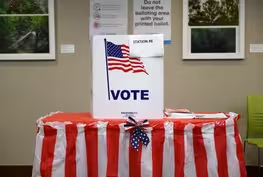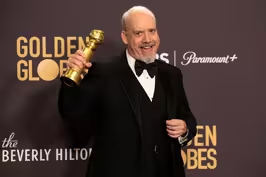
Navalny's widow vows to continue his fight for a free Russia
Clip: 2/19/2024 | 9m 8sVideo has Closed Captions
Alexei Navalny's widow vows to continue his fight for a free Russia
Alexei Navalny's death Friday in a Russian Arctic prison continues reverberating around the globe. World leaders, including President Biden, spoke Monday of stepped-up sanctions against Russia as Navalny's widow picked up his fight against Vladimir Putin. Andrei Soldatov, an investigative journalist and Center for European Policy Analysis senior fellow, joins William Brangham to discuss.
Problems playing video? | Closed Captioning Feedback
Problems playing video? | Closed Captioning Feedback
Major corporate funding for the PBS News Hour is provided by BDO, BNSF, Consumer Cellular, American Cruise Lines, and Raymond James. Funding for the PBS NewsHour Weekend is provided by...

Navalny's widow vows to continue his fight for a free Russia
Clip: 2/19/2024 | 9m 8sVideo has Closed Captions
Alexei Navalny's death Friday in a Russian Arctic prison continues reverberating around the globe. World leaders, including President Biden, spoke Monday of stepped-up sanctions against Russia as Navalny's widow picked up his fight against Vladimir Putin. Andrei Soldatov, an investigative journalist and Center for European Policy Analysis senior fellow, joins William Brangham to discuss.
Problems playing video? | Closed Captioning Feedback
How to Watch PBS News Hour
PBS News Hour is available to stream on pbs.org and the free PBS App, available on iPhone, Apple TV, Android TV, Android smartphones, Amazon Fire TV, Amazon Fire Tablet, Roku, Samsung Smart TV, and Vizio.
Providing Support for PBS.org
Learn Moreabout PBS online sponsorshipWILLIAM BRANGHAM: Alexei Navalny's suspicious death Friday in a Russian arctic penal colony continues to reverberate around the globe.
World leaders, including President Biden, spoke today of stepped-up sanctions against Russia, as Navalny's widow picked up his fight against Vladimir Putin.
Meanwhile, Russian authorities said they would hold Navalny's remains for a further two weeks.
Heavy with equal parts grief and resolve, Yulia Navalnaya released this video today vowing to keep up her husband's fight.
YULIA NAVALNAYA, Widow of Alexei Navalny (through translator): By killing Alexei, Putin killed half of me, half of my heart and half of my soul.
But I still have the other half, and it tells me that I have no right to give up.
I will continue the work of Alexei Navalny, continue to fight for our country.
I urge you to stand next to me, to share not only my grief and endless pain, but also to share the rage.
WILLIAM BRANGHAM: Navalny's cause of death remains unknown.
Russian authorities blocked Navalny's mother from the morgue where her son's body is believed to be held.
Across Russia, more than 50,000 people have now signed a petition demanding Navalny's body be released.
Today, his widow met with European Union ministers in Brussels as they weighed how to respond to the dissident's death.
MICHEAL MARTIN, Irish Foreign Minister (through translator): What has happened reminds us all of the repressive and oppressive nature of the regime in the Russian Federation and of how President Putin has ruthlessly put down any opposition and suppressed any dissent.
WILLIAM BRANGHAM: In Moscow, Kremlin spokesman Dmitry Peskov blasted Western leaders who have blamed Putin for Navalny's death.
DMITRY PESKOV, Spokesman for Vladimir Putin (through translator): An investigation is under way, and all necessary actions in this regard are being carried out.
But, so far, the results of this investigation have not been made public, and, in fact, they're unknown.
Therefore, in conditions when there is no valid information, we believe that it is absolutely inadmissible to make such, well, frankly, boorish statements.
WILLIAM BRANGHAM: Makeshift memorials have popped up across Russia, as mourners pay tribute to Navalny's legacy.
VARVARA, Russia (through translator): He was a very strong person, and I think all of Russia is suffering because we lost such a hero.
WILLIAM BRANGHAM: In St. Petersburg, men clad in black removed flowers from a memorial, carrying them away in garbage bags.
But moments later, Navalny's supporters returned to replace them.
Other memorials have also been dismantled across the country, and police have detained nearly 400 people for attending events commemorating Navalny's death.
With less than a month to go before Russia's national election, and with Putin's victory all but certain, Navalny's death further scatters and weakens an already thin opposition movement.
For the latest on Navalny's death and what it might mean for the future of Russia's opposition movement, we turn to Andrei Soldatov.
He's a Russian investigative journalist and a senior fellow at the Center for European Policy Analysis.
Andrei, thank you so much for being here.
It has been four days since Navalny's death was announced.
Russian authorities have not allowed his family to see his body or take possession of his body.
What do we know about the circumstances surrounding his death?
ANDREI SOLDATOV, Russian Investigative Journalist: Well, to be honest, the circumstances are getting more and more mysterious.
The initial official version was that he died on the 16th, but now there are some reports from -- unofficial reports from his penal colony that probably he died the day before, because that's when there was a lot of unusual activities, lots of cars coming to this place.
And, apparently, it was somehow connected to his sudden death.
Why he died, we still do not know.
We have no clue.
The official reason is sudden death, whatever it means.
And, as you pointed out, the family does not have any access to his body.
WILLIAM BRANGHAM: Do you think that his family will ever truly know what happened?
ANDREI SOLDATOV: I very much hope so.
Of course, we have a very long record of political assassinations under mysterious circumstances over the last 20-plus years under Vladimir Putin.
And every time, it was extremely difficult to establish the cause.
And we have a number of poisonings and very few people we actually know what was used against them in several cases.
So, we -- even now, after 20 years, we do not know for instance what was used against famous Russian journalist Yuri Shchekochikhin in 2003 and what was used against Anna Politkovskaya.
WILLIAM BRANGHAM: President Biden and many other leaders have squarely placed the blame for this death on Vladimir Putin.
Do you share that belief?
ANDREI SOLDATOV: Yes, absolutely.
I think what we have been seeing over the last three years was a deliberate systematic effort to kill Navalny, not just to isolate him, but to kill him.Moving him up north to more and more horrible conditions, and what happened before, I mean, his poisoning is a very clear sign that he was a target of a political assassination.
It just failed back then, but they didn't fail now.
We also know that Vladimir Putin, being a very practical man, made a political assassination part of his toolkit.
And now we can say that, well, we have the upcoming election.
Putin is extremely nervous.
Again, it makes a perfect practical sense for him.
WILLIAM BRANGHAM: Can you help me understand something, though?
Because after that poisoning that Navalny survived, he returned to Russia.
He had to know that he would be imprisoned, perhaps for the rest of his life.
Help us understand why he might have done that.
ANDREI SOLDATOV: First of all, Navalny didn't believe in his political future in exile.
He believed that he needed to get back and that he needed to conduct his political activity in the country.
He was a strong believer of this idea.
Of course, now the circumstances completely changed, but remember that it was before the full-scale invasion started.
And it appeared to some people, including Navalny, that there was still some room for legitimate political activity in the country.
He also built a very impressive network of supporters all over the country.
And he didn't want to abandon them.
And he believed that, ethically, he needed to be with them in Russia.
Of course, he took his chances.
And it was extremely brave.
But, well, Vladimir Putin decided to imprison him and finally to kill him.
WILLIAM BRANGHAM: What does this do to the opposition movement in Russia?
I mean, that movement has been splintered and fractured and disparate for many, many years.
Now, with its ostensible leader gone, what does that do to that movement?
ANDREI SOLDATOV: Well, it's impossible to deny that it is a horrible blow, because, as you pointed out, yes, the movement was never cohesive, and there were always problems and arguments within the community of Russian activists and opposition politicians.
Navalny was the most popular politician.
And, of course, it is a blow.
At the same time, he and his organization made possible several things which political opposition believed was just impossible.
For instance, he organized protests in Russian regions.
And we always had this concept that Russian liberals live only in big cities like Moscow or St. Petersburg.
Navalny changed that.
For that, he built an organization.
For that, he got his supporters and network of people.
These people are still there.
They are not going anywhere.
Some of them are still in the country.
Some of them left, but they are all very much active.
And they are determined to remain active politically.
WILLIAM BRANGHAM: All right, Andrei Soldatov, thank you so much for joining us.
ANDREI SOLDATOV: Thank you.
A Brief But Spectacular take on building trust in school
Video has Closed Captions
Clip: 2/19/2024 | 5m 47s | A Brief But Spectacular take on building trust in school (5m 47s)
How 2020 election denialism became a litmus test for the GOP
Video has Closed Captions
Clip: 2/19/2024 | 7m 18s | How 2020 election denialism became a litmus test for the GOP (7m 18s)
Paul Giamatti on his Oscar-nominated role in 'The Holdovers'
Video has Closed Captions
Clip: 2/19/2024 | 7m 20s | Actor Paul Giamatti discusses his Oscar-nominated performance in 'The Holdovers' (7m 20s)
Poland's foreign minister on concerns US will abandon allies
Video has Closed Captions
Clip: 2/19/2024 | 7m 50s | Poland's foreign minister on concerns the U.S. will abandon Ukraine, Europe (7m 50s)
Tamara Keith and Amy Walter on South Carolina's primary
Video has Closed Captions
Clip: 2/19/2024 | 10m 21s | Tamara Keith and Amy Walter on South Carolina's primary and Trump's legal woes (10m 21s)
Providing Support for PBS.org
Learn Moreabout PBS online sponsorship
- News and Public Affairs

FRONTLINE is investigative journalism that questions, explains and changes our world.

- News and Public Affairs

Amanpour and Company features conversations with leaders and decision makers.












Support for PBS provided by:
Major corporate funding for the PBS News Hour is provided by BDO, BNSF, Consumer Cellular, American Cruise Lines, and Raymond James. Funding for the PBS NewsHour Weekend is provided by...




